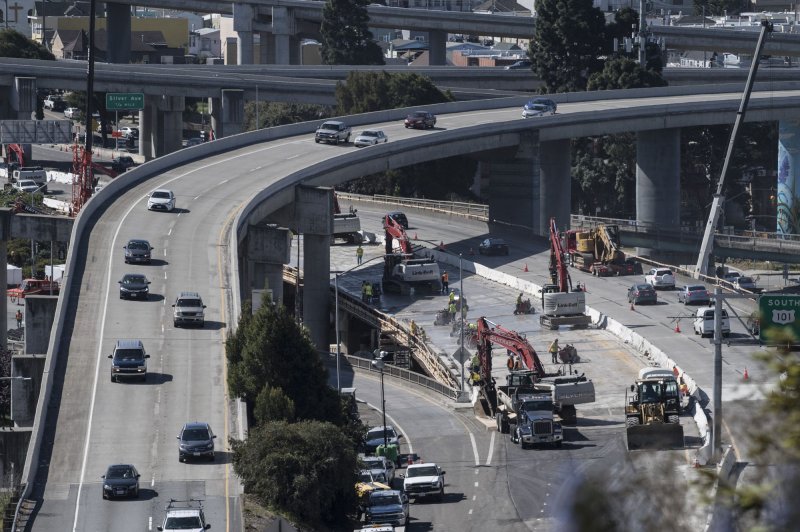1 of 3 | Former President Donald Trump has signaled that he will aim to rollback President Joe Biden’s policies seeking to limit emissions and promote sales of electric vehicles if elected in 2024. File Photo by Terry Schmitt/UPI |
License PhotoJuly 2 (UPI) — Former president Donald Trump has signaled his plan to roll back President Joe Biden‘s efforts to cut emissions and curb climate change. Some of Biden’s initiatives are expected to endure in some form.
During Thursday’s presidential debate, Trump indicated that he would again pull the United States out of the Paris Agreement, an international treaty meant to help member countries mitigate climate change. He has also pledged to ease regulations so that he may “open up” the use of gas, oil and coal for energy.
The former president took aggressive steps to rollback President Barack Obama‘s environmental and energy policies when he took office in 2017. Among those changes: slashing at fuel emission standards.
Biden addressed Trump’s laxed regulations and emission standards when he took office, embracing electric vehicles and recommitting to the Paris Agreement.
The Environmental Protection Agency announced its final rule on emission standards earlier this year for model year 2027 vehicles, emphasizing reducing the emissions of light- and medium-duty vehicles, including passenger vehicles. The rule went into effect in June.
Biden’s embrace of electric vehicles has helped quadruple sales during his time in the Oval Office. A change in the White House is not enough to slow the electrification of U.S. transportation, EV proponents say.
Electric vehicles are part of a bigger plan by the Biden administration to curb U.S. carbon emissions and combating climate change.
Last year was the hottest year on record, dating back to 1850, according to the World Meteorological Organization. The 10 warmest years have all been recorded in the last decade. The World Meteorological Organization warns that historically high temperatures will bring about extreme weather events in the next five years.
Climate experts have also warned of catastrophic and irreversible effects on the planet if carbon and greenhouse gas emissions are not significantly reduced soon.
In Biden’s first year in office, he announced the goal to have at least half of all new vehicles made in the United States to be electric by 2030 in an effort to reduce greenhouse gas emissions. He has since championed initiatives to accelerate EV adoption, headlined by significant investments from the Infrastructure Investment and Jobs Act.
Trump has not only cast skepticism over how the transition to electric will affect the auto industry, he has been critical of the vehicles. Among his criticisms are the costs to own an EV and the distance one can travel with a full battery.
The average cost of an electric car in April was about $55,242, according to Kelley Blue Book. The average cost for a gas-powered vehicle was about $44,989.
The distance an electric vehicle can travel on one charge ranges from 110 to 300 miles, according to the Alternative Fuels Data Center, a Department of Energy resource. Gas-powered vehicles can typically travel between 200 and 400 miles on a full tank.
Trump and some Republicans in Congress have vocally opposed many of the clean, “green” initiatives supported by the Biden administration. All while minimizing the scientific research that links climate change to human activity and the perils it may bring or has wrought.
The former president has vowed to slash at Biden’s clean energy initiatives if elected and pull back on the stricter regulations the current administration has imposed.
The Biden administration’s investment into EV adoption has also emphasized building out the infrastructure necessary to support it.
Ingrid Malmgren, senior policy director at Plug In America, told UPI one of the main concerns EV owners have is a lack of access to charging stations. This is especially a barrier for those who rent or live in multifamily housing.
Using a public charging station can cost up to four times more than using a personal charger.
“This administration and Congress has passed some of the most important climate change legislation in history,” said Malmgren. “Last year there were more than 1.4 million EV and plug-in hybrid electric vehicles sold in the United States. We’re on track for that or more. Charging infrastructure has almost tripled, up 289% since 2020.”
Charging stations are easily accessible in some parts of the United States. There are about 73,500 charging stations across the country. California, where EVs have been most widely adopted, has more than 17,000 and the average distance between them is about 10 miles.
Stations are not as common elsewhere, such as the Midwest, Mid-South and northern Great Plains.
The Charging and Fueling Infrastructure Discretionary Grant program seeks to increase accessibility to charging stations in both urban and rural areas. The Infrastructure Law is funding this program for $2.5 billion over the course of five years. The first round of grants were awarded last year.
Ten of last year’s grant recipients are in California. Washington received four grants, the second most of any state.
Investment in clean energy and electric or low-emission transportation has steadily increased, setting a record in the first quarter of the year with $71 billion invested into new projects. This trend began with Biden’s first quarter in office, according to Clean Investment Monitor.
“The electric vehicle transition will continue regardless of who is in office,” Malmgren said. “Legacy automakers are committed to electric vehicles. On one hand there’s a lot of anti-EV rhetoric I’m hearing. On the other hand there are meetings between Elon Musk and Donald Trump. Even the skeptics expect to be driving electric vehicles in the next three to five years.”
Trump has warned that Biden’s initiatives will disproportionately benefit Chinese EV and battery manufacturers. In a campaign speech he claimed it will lead to a “bloodbath” in the U.S. automotive industry.
China is the leading electric vehicle producer in the world, accounting for more than half of the vehicles manufactured annually. It also produces about two-thirds of the lithium-ion batteries used in EVs, according to a 2023 report by the International Energy Agency.
Malmgren said China has benefited from a “head start” in manufacturing EVs, but U.S. automakers can compete.
“They started investing in electric vehicle manufacturing long before the U.S. did,” Malmgren said. “We have definitely caught up. This is an incredible opportunity for the U.S. to create a circular economy.”
Biden announced last month new measures to halt China from “undercutting” U.S. industries. The White House increased the tariffs on Chinese EVs from 25% to 100%, and upped the tariffs on EV batteries from 7.5% to 25%.
The Inflation Reduction Act instituted tax credits for electric car buyers, offering credits of $4,000 for used and $7,500 for new vehicles. China issued a complaint against the United States and World Trade Organization over the tax credits earlier this year. It claims that the policy discriminates against Chinese goods in violation of existing trade agreements.

